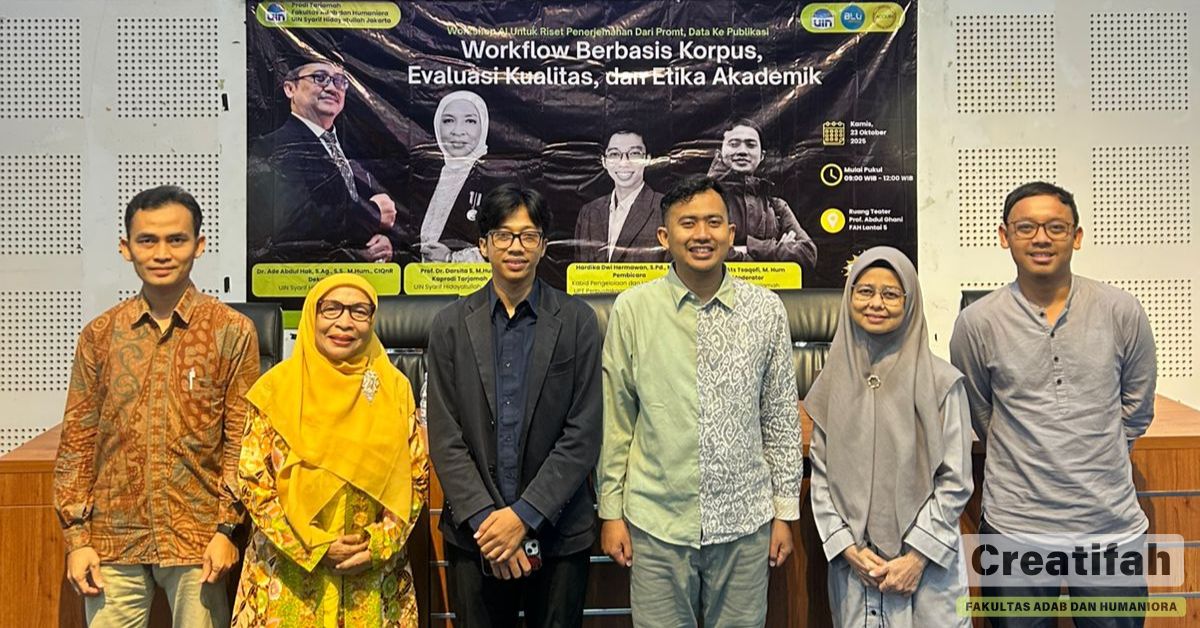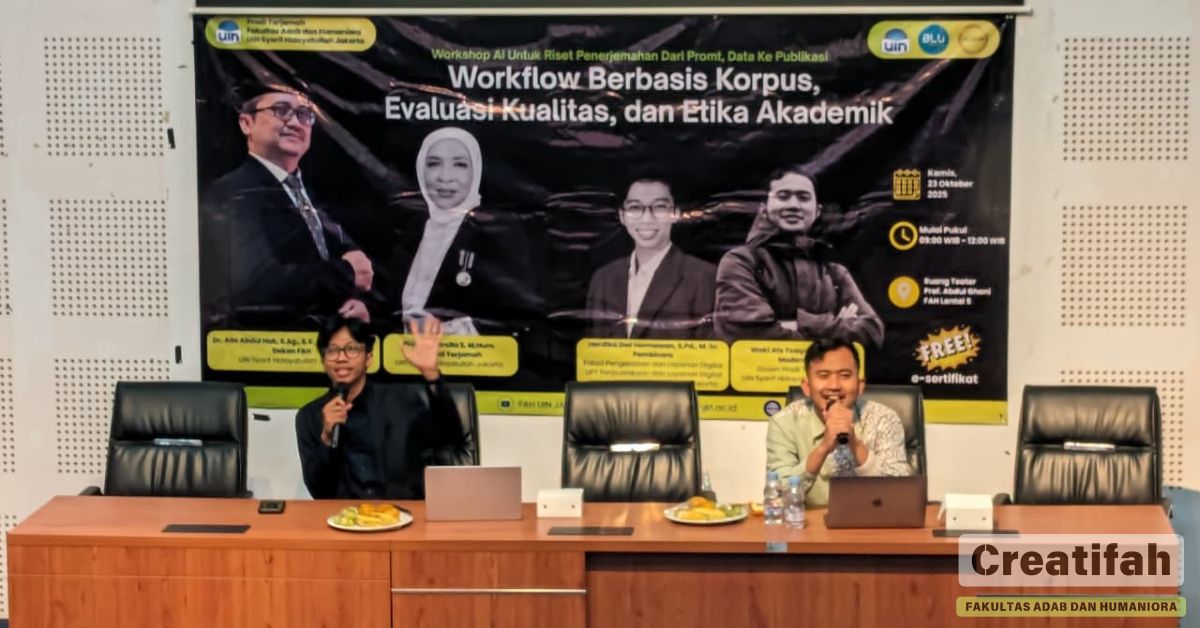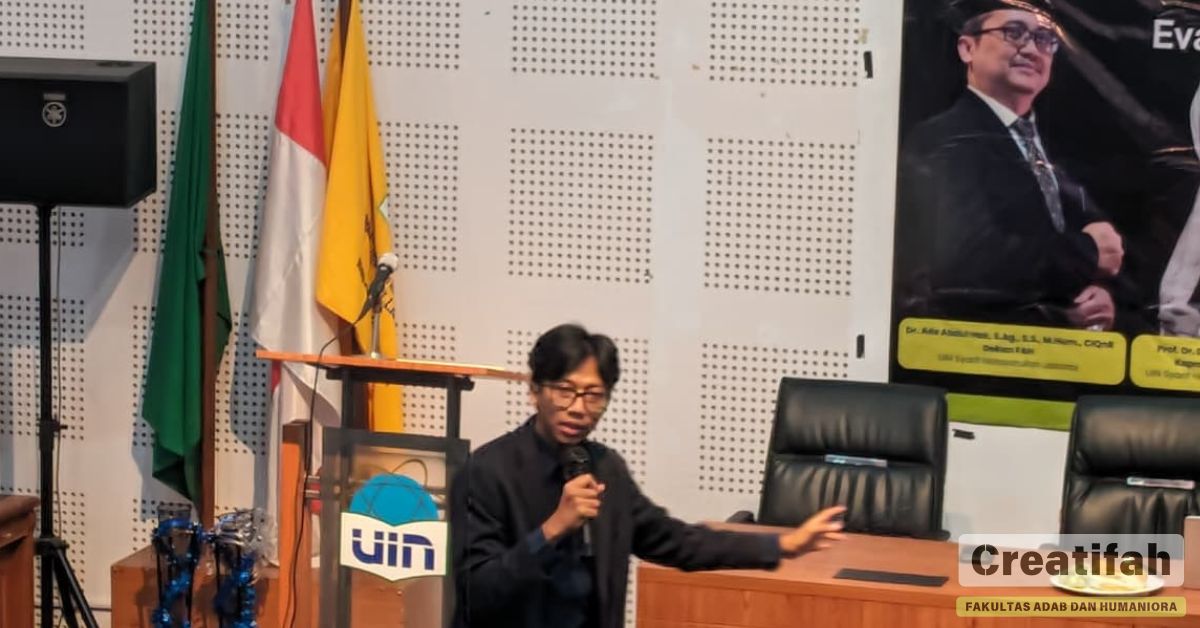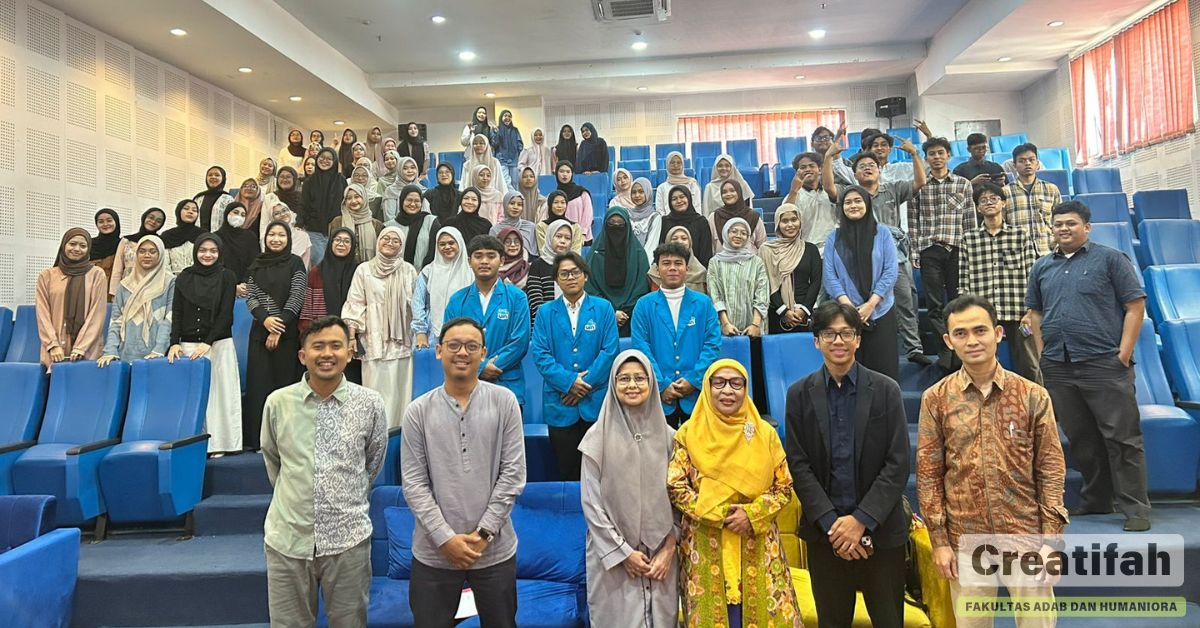Tarjamah Study Program Holds AI Workshop for Translation Research with Corpus-Based Workflow, Quality Evaluation, and Academic Ethics
Abdul Ghani Theater, FAH Online News – Tarjamah study program, Faculty of Adab and Humanities UIN Syarif Hidayatullah Jakarta held an AI workshop with the theme AI for Translation Research from Prompt, Data, to Publication on Thursday 23 October 2025. This activity was initiated by the Tarjamah study program and carried out at the Abdul Ghani Theater, Faculty of Adab and Humanities, attended by one hundred audiences consisting of students from the Tarjamah study program for semesters 1 to 7, as well as lecturers from the Tarjamah study program.
Remarks were made by Prof. Dr. Darsita S, M.Hum as Head of the Tarjamah Study Program. In his speech, he said that the translation research landscape in the current era is so fast, not because of advances in AI models but rather about how we design scientific questions. Managing data, building a corpus, evaluating translation quality, and communicating research results to scientific publications require strong methodological discipline, higher transparency and academic integrity.
“Hopefully this workshop will be a collective effort to present research in the field of translation that is stricter, more ethical and has an impact on society so that it becomes a charity for all of us,” he concluded.
The series of events then continued with the delivery of material by Hardika Dwi Hermawan, S.Pd., M.Sc., as Head of Digital Management and Services at the UPT Library at Muhammadiyah University of Surakarta. This session was hosted by Waki Ats Tsaqofi, M.Hum., from the Tarjamah Study Program lecturer
The material presented is broadly divided into four channels; 1) not yet utilizing artificial intelligence (KA) tools optimally, 2) understanding the urgency of using trains, 3) Demonstration of using trains to support research productivity, and 4) participants were able to use trains for research as the final goal.
Based on the data presented, the majority of research respondents are known to have utilized artificial intelligence (AI)-based technology in academic activities with a frequency that is quite frequent to very frequent. From the same data, ChatGPT was recorded as the AI tool most used by respondents. Meanwhile, workshop participants said that the majority of them more often use Gemini AI as their main platform to support academic activities.
“Higher technology must be balanced with higher levels of critical thinking, ” emphasized Hardika.
Furthermore, Hardika explained the importance of mastering AI competencies, both for users and developers. He explained the concept of AI literacy programs, and introduced generative AI with descriptions of its advantages, types and various benefits in the academic world.
In the middle of the material delivery session, Hardika also included a practical session in the form of a demo using AI for research in the academic field. The AI used is ChatGPT, Connected Paper, and SciSpace. In this practical session, participants are guided by presenters, then participants are given the challenge to carry out a search to find research topics in the field of Tarjamah.
Out of a total of 30 participants who took part in the challenge, four names were selected to present the results of their work. The four participants are Ridwan, Arul, Juniarko, and Anggi.
In their presentation, each participant presented the results of the answers produced by GPT, including research topics, problem background, context, problem formulation, supporting data, as well as other aspects relevant to the field of study in the Tarjamah Study Program.
Furthermore, the results of this presentation received a direct response from Mr. Waqi Ats Tsaqofi, M.Hum., as a lecturer in the Tarjamah Study Program. He provided a number of constructive inputs and critical questions to the four students to enrich their understanding and sharpen the direction of the research they developed.
After the material presentation session ended, the event continued with an interactive discussion session with the workshop participants. On this occasion, participants enthusiastically asked various questions and responses regarding the application of artificial intelligence in research and academic activities.
Closing the discussion session, Hardika Dwi Hermawan, S.Pd., M.Sc. conveyed the important message that the use of technology, especially artificial intelligence, must be carried out wisely and responsibly.
“We must use AI wisely. "Don't let us be controlled by technology, but we are the ones who must be able to control it," stressed Hardika.
To conclude the activity, Mr. Waqi Ats Tsaqofi, M.Hum. also emphasized the importance of competence in the field of translation.
“Translation is a matter of competence, and how this competence can be applied,” he said.
The event was then again guided by the MC with the agenda of handing over the speaker's certificate to Hardika Dwi Hermawan, S.Pd., M.Sc. by Mr. Dzacky Mubarok, M.Hum., as well as handing over the moderator's certificate by Mr. Abdullah Maulani, M.Hum.
As the final series, the activity closed with a prayer reading led by Mr. Dzacky Mubarok, M.Hum., marking the solemn end of the entire workshop agenda.
Written by: Alfi Khusnul Fauziah
Documentation:




